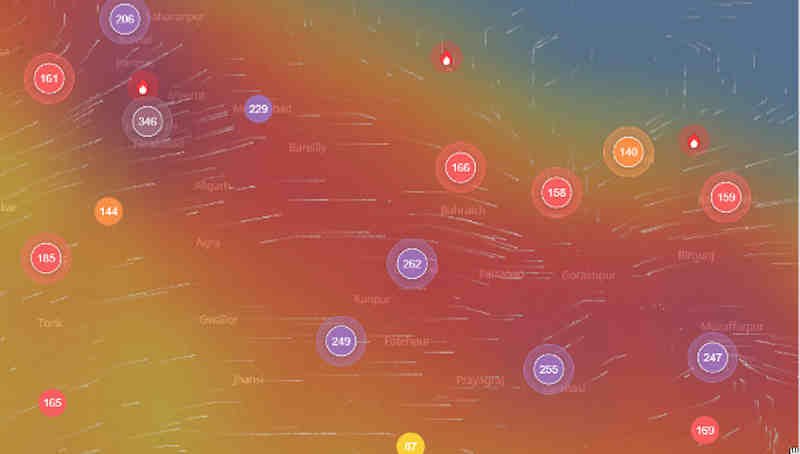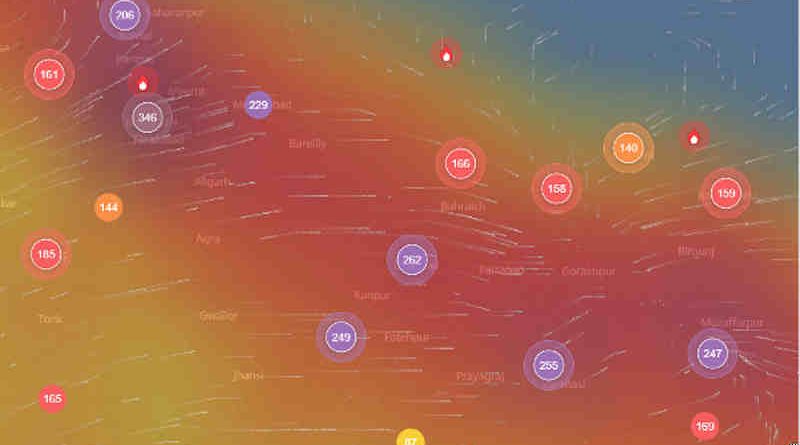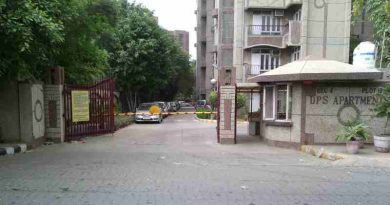IQAir Study Reveals the Cost of Air Pollution in 2020

IQAir Study Reveals the Cost of Air Pollution in 2020
Although early 2020 lockdowns for Covid-19 slowed global air pollution by reducing travel and associated pollutants, the impact was brief.
In 2020, air pollution resulted in over 160,000 deaths in the world’s five largest cities. The economic cost of air pollution from reduced productivity for just these five cities has been estimated to be over $85.1 billion.
Many of these deaths were preventable – they may not have occurred had these 160,000 people not been exposed to air pollution. These estimates from researcher IQAir speak to the need for greater public emphasis on air pollution prevention and control as well as investment in air cleaning and monitoring technologies.
In response to this global crisis, Greenpeace Southeast Asia partnered with IQAir to create the Cost of Air Pollution estimator. Using the IQAir air quality database, drawn from over 80,000 sensors worldwide, the estimator calculates deaths and economic costs incurred in select cities during 2020.
Air pollution’s impacts have been felt globally, especially in the world’s five largest cities.
Tokyo, Japan: 40,000 deaths, $43 billion USD lost
Delhi, India: 54,000 deaths, $8.1 billion USD lost
Shanghai, China: 39,000 deaths, $19 billion USD lost
Mexico City, 15,000 deaths, $8 billion USD lost
Sao Paulo, Brazil: 15,000 deaths, $7 billion USD lost
- Total Deaths: 163,000
- Total Cost: $85.1 billion USD
These five cities have a combined population of 137 million people, or nearly 2 percent of the world’s total population.
The IQAir platform measures ground-level particulate matter (PM2.5) in real time. This data is then combined with a city’s population, health data, and scientific risk models to determine mortality and cost estimates.
PM2.5 is particulate matter pollution measuring 2.5 microns or less. These microscopic particles are considered a major threat to human health. PM2.5 can be inhaled and absorbed into the bloodstream, impacting both the respiratory and cardiovascular system.
According to IQAir, although early 2020 lockdowns for Covid-19 slowed global air pollution by reducing travel and associated pollutants, the impact was brief. The Cost of Air Pollution estimator demonstrates that air pollution still caused many deaths in major cities around the world.
Delhi, Tokyo, and Shanghai were the top three cities for estimated deaths among the selected cities. While the Covid-19 lockdowns may have temporarily reduced air pollution, emerging research suggests that exposure to pollutants may have increased Covid-19 deaths.
A 2020 study published in Science Advances found that if a U.S. county had a history of higher exposure levels to PM2.5 (an increase of 1 μg/m3 in the county’s long-term PM2.5 exposure), that county experienced an 11% increase in their Covid-19 mortality rate.
Air pollution can have huge economic consequences for people and their communities, including:
- reduced work hours and shifts
- increased health care costs from disability, asthma, and chronic respiratory disease
- lost household income from caregiving for ill family members
For communities, air pollution’s economic costs can mean lowered economic productivity from work absences and overall reduced life expectancy.
The Cost of Air Pollution estimator considers these factors, among others, in calculating a city’s economic cost. In terms of absolute cost, five global cities lost an estimated $135 billion USD to air pollution in 2020. Tokyo, Los Angeles, and New York City had the highest air pollution losses among the cities examined in 2020.
Tokyo, Japan: $43 billion USD lost
Los Angeles, California: $32 billion USD lost
New York City, New York: $25 billion USD lost
Shanghai, China: $19 billion USD lost
Beijing, China: $16 billion USD lost
Los Angeles, California had the greatest per capita air pollution cost in the world, at $2,700 USD per person.
Residents in the next three cities after Los Angeles experienced $1,400 USD per capita or more in air pollution costs:
Berlin, Germany: $1,900 USD
Canberra, Australia: $1,700 USD
Yunlin, Taiwan: $1,400 USD
Two cities in northern India lost at least 13 percent of their gross domestic product, or GDP, in 2020 to air pollution:
Lucknow: 14 percent of GDP
Delhi: 13 percent of GDP
India’s projected national GDP for 2020 was $2.6 trillion USD, the sixth highest GDP in the world. But despite India’s high-ranking national GDP, northern Indian cities experienced disproportionate financial consequences from air pollution compared to other global cities.
According to IQAir, poor air quality is taking a calculable toll on the world’s largest cities. The calculations provided through the Cost of Air Pollution estimator capture a real-time snapshot of the key health and economic costs that result from air pollution. These estimates tell us that not enough is being done to save lives and improve global quality of life.
Air pollution’s extreme human and financial costs demand greater need for air quality activism, accountability, pollution prevention, and clean air technologies.
You can find out where your city ranks among the world’s most polluted cities. Monthly PM2.5 air quality index levels for the prior year are provided for thousands of cities.
IQAir is a Swiss-based air quality technology company which operates in more than 100 countries worldwide.




